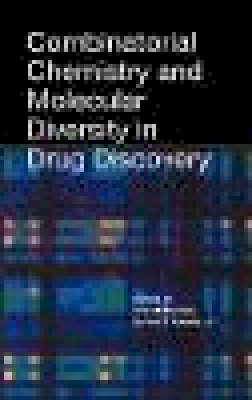
Stock image for illustration purposes only - book cover, edition or condition may vary.
Combinatorial Chemistry and Molecular Diversity in Drug Discovery
Gordon
€ 274.42
FREE Delivery in Ireland
Description for Combinatorial Chemistry and Molecular Diversity in Drug Discovery
Hardcover. COMBINATORIAL CHEMISTRY AND MOLECULAR DIVERSITY IN DRUG DISCOVERY Edited by Eric M. Gordon and James F. Kerwin, Jr. Increasing pressure to identify, optimize, develop, and commercialize novel drugs more rapidly and more cost-effectively has led to an urgent demand for technologies that can reduce the time to market for new products. Editor(s): Gordon, Eric M.; Kerwin, James F. Num Pages: 544 pages, Illustrations. BIC Classification: MMG; TDCW. Category: (P) Professional & Vocational; (UP) Postgraduate, Research & Scholarly; (UU) Undergraduate. Dimension: 244 x 165 x 34. Weight in Grams: 936.
COMBINATORIAL CHEMISTRY AND MOLECULAR DIVERSITY IN DRUG DISCOVERY
Edited by Eric M. Gordon and James F. Kerwin, Jr.
Increasing pressure to identify, optimize, develop, and commercialize novel drugs more rapidly and more cost-effectively has led to an urgent demand for technologies that can reduce the time to market for new products. Molecular diversity, of both natural and synthetic materials, provides a valuable source of compounds for identifying and optimizing new drug leads. Through the rapidly evolving technology of combinatorial chemistry, it is now possible to produce libraries of small molecules to screen for novel bioactivities. This powerful new technology has begun to help pharmaceutical companies find new drug candidates quickly, save significant dollars in preclinical development costs, and ultimately change their fundamental approach to drug discovery.
Comprising the work of the leading authorities in the area of molecular diversity and combinatorial chemistry, Combinatorial Chemistry and Molecular Diversity in Drug Discovery highlights the critical concepts and issues involved in implementing combinatorial chemistry to create chemical libraries. The authors, industrial and academic experts in the field, apply combinatorial technologies to drug discovery and development and place co-evolving technologies and practices in a global framework.
Included among the many topics:
* Historical background.
* Library strategy and design.
* Solid-phase synthesis.
* Small molecular libraries.
* Automation, analytical, and computational methodology.
* Biological diversity.
* Strategies for screening combinatorial libraries.
* Combinatorial drug screening and development.
* Combinatorial chemistry information management.
Combinatorial Chemistry and Molecular Diversity in Drug Discovery is one of the first comprehensive books to cover this explosive area. It is must reading for medicinal chemists, pharmacologists, molecular biologists, biochemists, enzymologists, and drug discovery research managers in industry, academia, and government.
Edited by Eric M. Gordon and James F. Kerwin, Jr.
Increasing pressure to identify, optimize, develop, and commercialize novel drugs more rapidly and more cost-effectively has led to an urgent demand for technologies that can reduce the time to market for new products. Molecular diversity, of both natural and synthetic materials, provides a valuable source of compounds for identifying and optimizing new drug leads. Through the rapidly evolving technology of combinatorial chemistry, it is now possible to produce libraries of small molecules to screen for novel bioactivities. This powerful new technology has begun to help pharmaceutical companies find new drug candidates quickly, save significant dollars in preclinical development costs, and ultimately change their fundamental approach to drug discovery.
Comprising the work of the leading authorities in the area of molecular diversity and combinatorial chemistry, Combinatorial Chemistry and Molecular Diversity in Drug Discovery highlights the critical concepts and issues involved in implementing combinatorial chemistry to create chemical libraries. The authors, industrial and academic experts in the field, apply combinatorial technologies to drug discovery and development and place co-evolving technologies and practices in a global framework.
Included among the many topics:
* Historical background.
* Library strategy and design.
* Solid-phase synthesis.
* Small molecular libraries.
* Automation, analytical, and computational methodology.
* Biological diversity.
* Strategies for screening combinatorial libraries.
* Combinatorial drug screening and development.
* Combinatorial chemistry information management.
Combinatorial Chemistry and Molecular Diversity in Drug Discovery is one of the first comprehensive books to cover this explosive area. It is must reading for medicinal chemists, pharmacologists, molecular biologists, biochemists, enzymologists, and drug discovery research managers in industry, academia, and government.
Product Details
Format
Hardback
Publication date
1998
Publisher
John Wiley and Sons Ltd United States
Number of pages
544
Condition
New
Number of Pages
544
Place of Publication
New York, United States
ISBN
9780471155188
SKU
V9780471155188
Shipping Time
Usually ships in 7 to 11 working days
Ref
99-50
About Gordon
Eric M. Gordon and James F. Kerwin are the authors of Combinatorial Chemistry and Molecular Diversity in Drug Discovery, published by Wiley.
Reviews for Combinatorial Chemistry and Molecular Diversity in Drug Discovery
"This monograph does an excellent job summarizing many of the important aspects regarding the synthesis, manipulation, and screening of combinatorial molecules for pharmacological activity...The editors are to be commended on assembling an admirable resource..." (The Quarterly Review of Biology Vol. 76, No. 2, June 2001)
